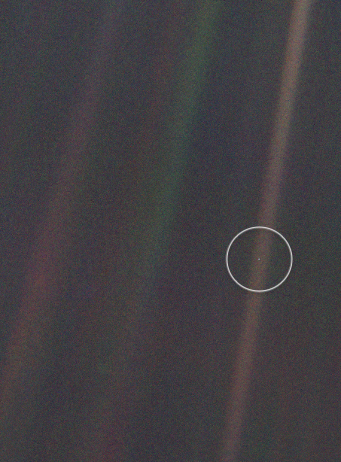Pale blue dot: A Covid-19 perspective
May 12, 2020
In his famous book “The pale blue dot”, Carl Sagan wrote about our unremarkable position in the Universe as human beings. This photo shows the pale blue dot; the image taken by the space probe Voyager 1 on February 14, 1990. As the spacecraft left our planetary neighborhood for the fringes of the solar system, NASA turned it around for one last look at our home planet.

As the world plunges into the unthinkable crisis of Covid-19, it is hard to find hope and courage to dream of a better day. Everything we know and love, our way of life, has reached a point of existential crisis. While many of our livelihoods are affected, many others are paying the dearest price of having to lose their loved ones.
Look again at that dot. That’s here. That’s home. That’s us. On it everyone you love, everyone you know, everyone you ever heard of, every human being who ever was, lived out their lives. The aggregate of our joy and suffering, thousands of confident religions, ideologies, and economic doctrines, every hunter and forager, every hero and coward, every creator and destroyer of civilization, every king and peasant, every young couple in love, every mother and father, hopeful child, inventor and explorer, every teacher of morals, every corrupt politician, every “superstar,” every “supreme leader,” every saint and sinner in the history of our species lived there–on a mote of dust suspended in a sunbeam.
If our species reaches an end to life as we know it, what stories will we tell our children? If our lives are chained by a Virus that we cannot even see, would we be able to look back and say that our hay day on Earth was well spent?
Think of the rivers of blood spilled by all those generals and emperors so that, in glory and triumph, they could become the momentary masters of a fraction of a dot. Think of the endless cruelties visited by the inhabitants of one corner of this pixel on the scarcely distinguishable inhabitants of some other corner, how frequent their misunderstandings, how eager they are to kill one another, how fervent their hatreds.
We, who can fly to the moon, take photos of black holes, detect gravitational waves, have been stripped of our imaginary pedestal to be at the mercy of the littlest of the little things on Earth.
Our posturings, our imagined self-importance, the delusion that we have some privileged position in the Universe, are challenged by this point of pale light. Our planet is a lonely speck in the great enveloping cosmic dark. In our obscurity, in all this vastness, there is no hint that help will come from elsewhere to save us from ourselves.
Covid-19 is Nature’s revenge on our arrogance and narrow-mindedness.
There is perhaps no better demonstration of the folly of human conceits than this distant image of our tiny world.
But hope springs eternal. In our battle against the Covid-19 virus, we must become cognizant of and believe in our collective good to spend the remainder of our alloted time here on Earth, not as masters of the planet, but as children of nature.
To me, it underscores our responsibility to deal more kindly with one another, and to preserve and cherish the pale blue dot, the only home we’ve ever known.
See anything to improve? Edit this post!